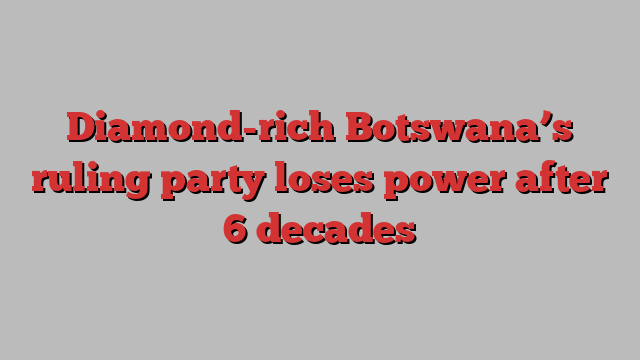
Unlock the Editor’s Digest for free
Roula Khalaf, Editor of the FT, selects her favourite stories in this weekly newsletter.
The party that governed diamond-rich Botswana, one of Africa’s wealthiest and most stable countries, has lost power for the first time in nearly 60 years.
President Mokgweetsi Masisi, 63, conceded defeat on Friday before the final tally from Wednesday’s election came in, urging supporters of his Botswana Democratic party to remain calm and saying he would support “a smooth transition process ahead of the inauguration”.
The left-leaning opposition Umbrella for Democratic Change, led by Harvard-educated Duma Boko, a human rights lawyer, looked set to replace the long-ruling BDP after securing 25 seats in the 61-seat legislature. Members of parliament elect the president.
Boko, 54, has not made an official statement, but his Wikipedia entry has already been updated, calling him the “president-elect”.
Although Botswana, a country of 2.5mn people with a GDP per capita of above $7,000 at market prices, is considered one of the best-run countries on the continent, Masisi’s presidency was rattled by an economic slump and allegations of corruption and mismanagement.
Falling global demand for diamonds, which account for four-fifths of the country’s exports and which have been hit by competition from synthetic stones, has knocked the economy. Growth in GDP last year dropped to 2.7 per cent, from 5.5 per cent in 2022. At least one in four people is unemployed.
“The economy has been struggling, in part because the explosion in lab-grown diamonds damped the price of natural diamonds,” said Peter Fabricius, a consultant for the Pretoria-based Institute for Security Studies.
Botswana has been credited with managing its diamond industry well and avoiding the resource curse by negotiating good deals with De Beers, which dominates the industry. But it has struggled to diversify its economy.
Botswana’s transition of power comes at a critical moment for the world’s biggest diamond business, as Anglo American is preparing to dispose of De Beers. The disposal plan is a key but difficult part of Anglo’s restructuring since it rejected a £39bn takeover bid from BHP, and will depend on good relations with Botswana’s government.
Botswana owns a 15 per cent stake in De Beers, which sources stones from the country through a joint venture with the government, Debswana. In its election manifesto, the UDC pledged to double the rate of economic growth within five years, establish a new sovereign wealth fund for Botswana and develop exports outside diamonds.
The ruling BDP, which won power in the first post-independence elections in 1966, has become more fractious in recent years, particularly after Masisi was elected in 2018.
Ian Khama, son of the country’s first president, had a bitter falling out with Masisi and is supporting the breakaway Botswana Patriotic Front.
The BDP is the latest dominant political party to wobble recently. In Mozambique, the ruling Frelimo liberation party resorted to widespread irregularities to ensure victory against resurgent opposition leader Venâncio Mondlane.
And in South Africa, the African National Congress, which has monopolised power since free elections in 1994, slumped to 40 per cent of the vote in the May polls, forcing it to form a coalition with its ideological rival, the Democratic Alliance.
“It seems there is some kind of contagion,” Fabricius said. “In many of these countries, there is an economic malaise, which has led to a deterioration in the quality of life, which the younger populations are not accepting. Each country is giving courage to the others.”